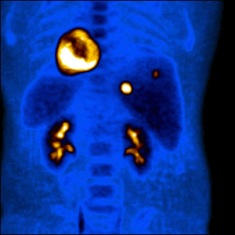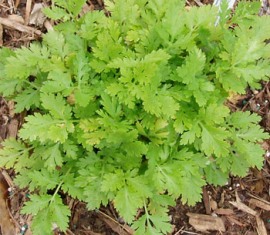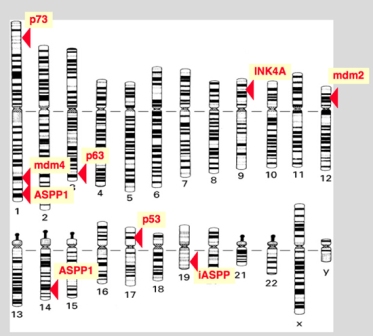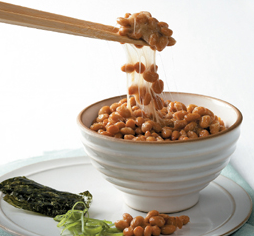 CEA (carcinoembryonic antigen) is a type of protein molecule that can be found in many different cells of the body, but is typically associated with certain tumors and the developing fetus. The most frequent cancer which causes an increased CEA is cancer of the colon and rectum. CEA is most frequently tested in blood. It can also be tested in body fluids and in biopsy tissue. The best use of CEA is as a tumor marker, especially for cancers of the gastrointestinal tract. When the CEA level is abnormally high before surgery or other treatment, it is expected to fall to normal following successful surgery to remove all of the cancer. A rising CEA level indicates progression or recurrence of …
CEA (carcinoembryonic antigen) is a type of protein molecule that can be found in many different cells of the body, but is typically associated with certain tumors and the developing fetus. The most frequent cancer which causes an increased CEA is cancer of the colon and rectum. CEA is most frequently tested in blood. It can also be tested in body fluids and in biopsy tissue. The best use of CEA is as a tumor marker, especially for cancers of the gastrointestinal tract. When the CEA level is abnormally high before surgery or other treatment, it is expected to fall to normal following successful surgery to remove all of the cancer. A rising CEA level indicates progression or recurrence of …
Colon cancer claims 200,000 lives in Europe and the USA each year. With 300,000 new cases per year, it is the second commonest cancer and is therefore highly relevant to general medical practice. Surgical treatment is still a viable option in order to extend the patient’s life. Doctors can remove the section of the colon with the tumor and sew the healthier sections together. Freezing the tumor and removing it, also known as cryotherapy, is also a viable option. Surgery may also be an option to remove other infected body parts, depending on the size of the areas infected.
However, in most patients, there is no evidence of distant metastasis at the time of surgery, but the cancer has penetrated deeply into …
 HerbalZym therapy is a new anti-cancer protocol where a cancer-killing substance is activated by natural enzymatic compounds. Utilizing this new approach to terminal cancer treatment gives those of us who have been treating cancer a weapon that is scientifically sound and well researched. For over 10 years now, over one thousand terminally ill cancer patients have been treated with this therapy with resounding success. We will discuss later the most remarkable things about all of these quite proven natural therapies.
HerbalZym therapy is a new anti-cancer protocol where a cancer-killing substance is activated by natural enzymatic compounds. Utilizing this new approach to terminal cancer treatment gives those of us who have been treating cancer a weapon that is scientifically sound and well researched. For over 10 years now, over one thousand terminally ill cancer patients have been treated with this therapy with resounding success. We will discuss later the most remarkable things about all of these quite proven natural therapies.
When a cancer cell, or any cell really, grows it activates two different pathways. The first stimulates cellular growth while the second, acting like a safety net, prevents the activated cells from dying from apoptosis (programmed cell death). There is a complex interaction between …
 In treating cancer, the life requirements such as Energy, Adaptation, Protection and Reproduction are critically important. Therefore, restoring energy through adaptogens, optimizing internal chemistry via detoxification, supporting the immune system with diet such as Immune Soup and Avocado and inducing apoptosis in cancer stem cells using natural compounds should be considered as promising targets for cancer, whatever type you are facing. Herbal medicine is a great medium with which to do these.
In treating cancer, the life requirements such as Energy, Adaptation, Protection and Reproduction are critically important. Therefore, restoring energy through adaptogens, optimizing internal chemistry via detoxification, supporting the immune system with diet such as Immune Soup and Avocado and inducing apoptosis in cancer stem cells using natural compounds should be considered as promising targets for cancer, whatever type you are facing. Herbal medicine is a great medium with which to do these.
There is no consensus as to whether cancer is a local or systemic disease, but the fact that the tumor is highly toxic suggests the need for blood cleansing and liver detoxification. Toxicity can be caused by chemical …
 Curcumin, the colouring matter of turmeric (Curcuma longa), has been reported to have chemo preventive as well as anticancer properties against various tumors. Curcumin is a yellow dye used for fabric and food colorations and was used as an antimicrobial finish due to its bactericidal properties on dyed textiles. Curcumin is almost totally insoluble in water and therefore has extremely low bioavailability. However, in the past 10 years there has been an explosion of information, really good documented information, on the affects of curcumin on different biochemical pathways that pertain to cancer and leukemia.
Curcumin, the colouring matter of turmeric (Curcuma longa), has been reported to have chemo preventive as well as anticancer properties against various tumors. Curcumin is a yellow dye used for fabric and food colorations and was used as an antimicrobial finish due to its bactericidal properties on dyed textiles. Curcumin is almost totally insoluble in water and therefore has extremely low bioavailability. However, in the past 10 years there has been an explosion of information, really good documented information, on the affects of curcumin on different biochemical pathways that pertain to cancer and leukemia.
Anticancer Properties of Curcumin
* Curcumin Inhibits Tumorigenesis
* Curcumin Exhibits Antiproliferative Effects against Cancer Cells
* Curcumin Down-Regulates the Activity of Epidermal Growth Factor Receptor (EGFR) and Expression of …
 Parthenolide is a substance found in several plants including Feverfew and Magnolia. Feverfew has been used for the treatment of migraine, arthritis, fever, and stomachache. Besides its anti-inflammatory and anti-migraine properties, parthenolide also shows anticancer activities in a variety of cancers. It contains an alpha-methylene-gamma-lactone ring and an epoxide moiety which are able to interact with nucleophilic sites of biologically important molecules.
Parthenolide is a substance found in several plants including Feverfew and Magnolia. Feverfew has been used for the treatment of migraine, arthritis, fever, and stomachache. Besides its anti-inflammatory and anti-migraine properties, parthenolide also shows anticancer activities in a variety of cancers. It contains an alpha-methylene-gamma-lactone ring and an epoxide moiety which are able to interact with nucleophilic sites of biologically important molecules.
Parthenolide modulates multiple targets, thereby contributing to its various effects. Inhibition of NF-kB activity, constitutive in many types of cancers, is considered one of the main mechanisms of its action. Study shows that parthenolide’s ability to inhibit NF-kB activity was enhanced by PTEN. PTEN is one of the most commonly lost tumor suppressors in human cancer.
Why would anyone choose to consider curing cancer alternatively or to look for a natural cure for cancer, either in the place of the officially recommended chemotherapy, radiation and surgery? The main reason may be that conventional cancer treatment is still far from reaching its long sought-after victory over cancer, even after decades of intensive research into which billions of dollars have been poured. On the contrary, cancer incidence and mortality have continued to steadily and dramatically rise in the Westernized world, with no end to this tendency in sight.
We believe one reason for this lack of progress is that traditional therapies do not destroy cancer stem cells. Cancer stem cells are the small number of cells within a tumor that are capable of fueling the tumor’s growth. These cells …
Cancer stem cells have been identified in acute myeloid leukemia and in breast, lung, colon, pancreatic, brain and prostate tumors. There is increasing evidence that standard treatments like chemo just kill the dividing “daughter” (progenitor) cells, without killing the cancer stem cell that neither divides rapidly nor dies. This is especially relevant for young women, as they have “aggressive” cancers, and although current therapies can stop the rapidly dividing daughter progenitor cancer cells. Women still relapse because the chemo has not affected or killed the therapy-resistant cancer stem cells that have the ability, when activated, to give rise to many daughter cells of high proliferate potential. It’s like trying to weed the garden. It’s no good just chopping off the leaves, we need to target the roots to stop the …
On the other hand, genistein is a multifunctional inhibitor of cancer cell growth. It induces apoptosis in virtually every cancer cell tested. It also kills tumors in clinical trials.
One of the most important tumor suppressor genes is TP53 (more commonly known as p53). This gene was originally identified as a germ-line mutation in the rare inherited cancer called Li-Fraumeni Syndrome, but it has since been shown to be involved in a wide variety of cancer types. The p53 gene is lost (e.g., the gene is deleted from the chromosome) in about 50 percent of all cancerous cells.
 The p53 protein is responsible for controlling the cell cycle checkpoint at the stage where the cell makes a decision to duplicate …
The p53 protein is responsible for controlling the cell cycle checkpoint at the stage where the cell makes a decision to duplicate …
 Over the years we have all read conflicting reports about the benefits of Soy in our diets. Some news has been scary. Other reports have been most positive. Consequently, it was most reassuring to see the results of a major study released in the December 2009 issue of the Journal of the American Medical Association (JAMA) that studied the intake of soy protein in patients who had breast cancer.
Over the years we have all read conflicting reports about the benefits of Soy in our diets. Some news has been scary. Other reports have been most positive. Consequently, it was most reassuring to see the results of a major study released in the December 2009 issue of the Journal of the American Medical Association (JAMA) that studied the intake of soy protein in patients who had breast cancer.
This study looked at over 5,000 patients and found that those individuals who had the highest intake of soy protein and isoflavones they contain, had the longest survival and the lowest risk of breast cancer recurrence.
This study has defined the use of soy foods that are rich in isoflavones, a major group of phytoestrogens, …